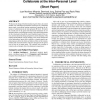566 search results - page 44 / 114 » Artificial Intelligence for Adaptive Computer Games |
ATAL
2008
Springer
14 years 11 months ago
2008
Springer
We discuss the design of the Intermediary Agent's brain, the control module of an embodied conversational virtual peer in a simulation game aimed at providing learning experi...
SAC
2004
ACM
15 years 3 months ago
2004
ACM
We study two properties of coalition formation algorithms, very important for their application in real-life scenarios: robustness and tolerance to some agent misbehaviors. The st...
SIGCSE
2004
ACM
15 years 3 months ago
2004
ACM
Multiagent systems is an attractive problem solving approach that is becoming ever more feasible and popular in today’s world. It combines artificial intelligence (AI) and distr...
BVAI
2007
Springer
15 years 4 months ago
2007
Springer
The promise of Brain-Computer Interfaces (BCI) technology is to augment human capabilities by enabling interaction with computers through a conscious and spontaneous modulation of ...
ATAL
2005
Springer
15 years 3 months ago
2005
Springer
In the design of resource bounded agents, high-level cognitive activities, such as reasoning, raise important problems related both to the adaptive ability and to the computationa...


